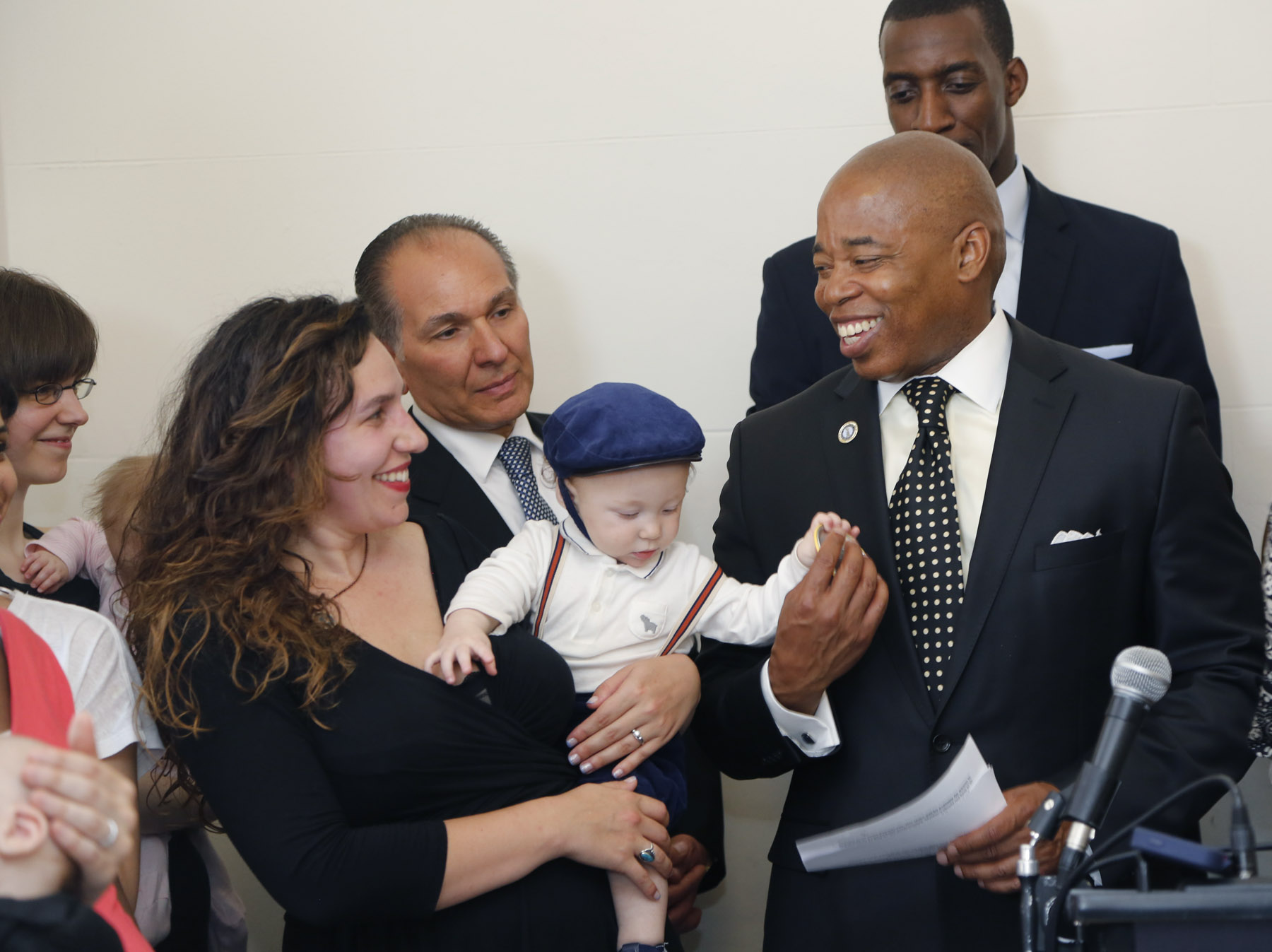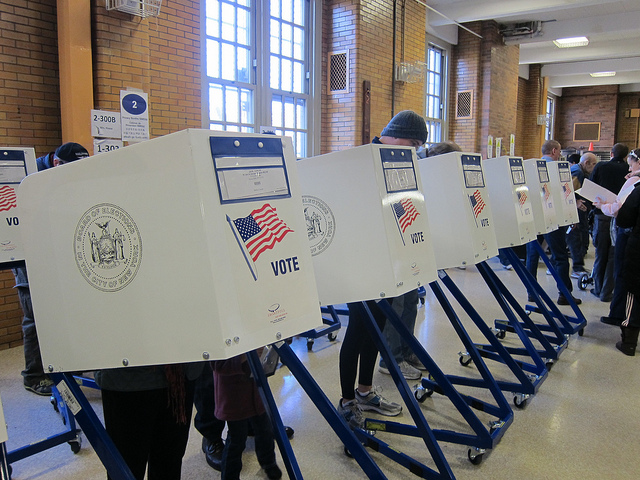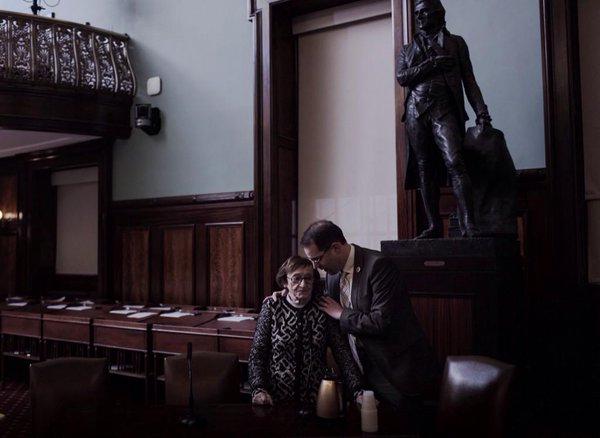Time to Say and Do More for Women's Health

Brooklyn Borough President Eric Adams
Tampons. Periods. Breastfeeding. Hot flashes.
These terms, and others relevant to women’s health, have traditionally been considered taboo — inappropriate for polite conversation and therefore left unmentioned. That silence has had serious consequences for women and girls, who are denied access to feminine hygiene products, charged more at the cash register for “women’s” versions of household items, and made to feel ashamed about their bodies.
This taboo extends to sexual health, with terrible costs for young adults who have been denied information about reproduction, contraception, and healthy relationships. As a result, the United States has disproportionately high rates of unintended pregnancy, sexually transmitted infections, and domestic violence.
The lack of healthy dialogue on these matters has delivered unhealthy results. Thankfully, strong leaders are stepping up and speaking out, and we’re beginning to see the benefits. Through the leadership of elected officials such as State Senator Sue Serino and Assembly Member Linda Rosenthal, with support from Council Speaker Melissa Mark-Viverito and Council Member Julissa Ferreras-Copeland, the New York State Legislature recently voted to eliminate the sales tax on tampons, sanitary napkins, and other feminine hygiene products. (Governor Andrew Cuomo has pledged to sign the bill).
Just as we provide an exemption from the sales tax for necessities such as groceries and clothing, feminine hygiene products will be properly defined as necessities for women who menstruate, not luxuries. The exemption will particularly assist low-income New Yorkers who have had to choose between or ration such basic necessities due to their limited resources.
New York City now has an opportunity to build on the momentum from this achievement. The City Council is preparing to hold a hearing on a critical proposal by Council Member Ferreras-Copeland and Speaker Mark-Viverito to offer feminine hygiene products for free in public schools, homeless shelters, and correctional facilities.
This is a logical extension of our shared interest in promoting common-sense public health measures, both physical and psychological. Consider that a girl in school who has her period but is not carrying tampons or pads must visit a guidance counselor or the school nurse and explain her situation, often needing to negotiate hall passes and having to wait to be seen - the entire experience seems to have been intended to maximize embarrassment and class time missed. In jail, each woman receives a very limited supply of feminine hygiene products each month while additional supplies are sold for extortionate prices at the commissary; many must improvise with rolled-up toilet paper, a humiliating and unhealthy situation. Any woman or girl who is forced to use menstrual items for long stretches of time, due to issues of access or affordability, is put at higher risk for cervical cancer, toxic shock syndrome, and other concerns resulting from product overuse.
We need action at all levels of government. In homeless shelters, many women and girls simply cannot afford to buy feminine hygiene products, as Supplemental Nutrition Assistance Program (SNAP), Women, Infants, and Children (WIC), and flexible spending accounts disallow such purchases. Legislation such as the Fund Essential Menstruation (FEM) Products Act of 2015 from Representative Grace Meng, which would reclassify feminine hygiene products to allow for purchase with flexible spending accounts, is essential to move forward and should be a bipartisan priority. For starters, we should ensure that every member of the New York State congressional delegation gets behind the bill.
These initiatives are critical to eliminating inequities that undermine the position of women in our civil society. A recent report from the New York City Department of Consumer Affairs (DCA), for example, documented that products sold to women cost seven percent more on average than nearly identical products sold to men. This includes basic hygiene products such as shaving razors. We have a shared responsibility, men and women alike, to demand that these disparities end now. Companies that continue this behavior need to be called out in the public arena and pressured to answer for these discrepancies.
We must continue to drive the conversation about gender equity, especially around women’s health, to break the silence and remove the taboos. When I became Brooklyn borough president, I was deeply concerned that women who have recently had children are often ostracized for breastfeeding and pumping milk at work or in public areas, despite the fact that the law protects their right to this practice. I was proud to open our lactation lounge at Brooklyn Borough Hall last year, as part of the Breastfeeding Empowerment Zone initiative by the New York City Department of Health and Mental Hygiene (DOHMH), so women in Downtown Brooklyn have a comfortable lounge in which to breastfeed or pump milk. And, we are able to raise awareness of the benefits of breastfeeding and to celebrate the practice.
I am now pressing forward with City Council Members Laurie Cumbo, Robert Cornegy, Jr., and Corey Johnson (the latter are two of the standout male leaders in the fight for advancing women’s health) on a proposal to require the City to create dedicated space for nursing moms in a range of municipal government offices that serve the public, such as New York City Human Resources Administration (HRA) job centers and New York City Administration for Children’s Services (ACS) borough offices.
This conversation should include the entirety of women’s lives. Our society has often avoided discussion of menopause, depriving many women of information about the symptoms of menopause such as hot flashes and an awareness of available treatments. In our celebration of Women’s History Month this past March, Council Member Cumbo and I organized a day of panel discussions and workshops to speak with women about every stage of life and to start a conversation surrounding the natural changes that occur in life, not only physically, but also emotionally and spiritually. For some, it was the first time anyone had engaged them on these topics. We ask businesses and other institutions to follow suit and to reasonably accommodate these life transitions.
The days of relegating women’s health to second-class status or worse are over, and our laws and policies must reflect that for every stage of a woman’s life. Men, who still write most of those laws and policies, have a responsibility to join in this conversation and to insist on fairness and equality.
***
Eric Adams is the president of Brooklyn. On Twitter @BPEricAdams.
***
Have an op-ed idea or submission for Gotham Gazette? Email This email address is being protected from spambots. You need JavaScript enabled to view it.
Paying the Overhead for Democracy in New York

(photo by Peter Duton)
My dad Ruby Benjamin worked as a professional basketball player, a New York City cop, a hosiery salesman and, for much of the second half of his life, the owner of a liquor store on West 31 Street, between Broadway and Sixth Avenue. He loved his first two jobs, but liked the last one the best (the sales job was another story entirely.) Twelve hours a day, six days a week in the store was grueling. “But nobody tells me what to do, Jerry,” he’d say to me. “I’m my own boss.”
Being the boss brought responsibilities that never came up when you worked for the city or some big company. “It costs money to put the key in the door,” my father said. “You have to cover the overhead.” The heating bill was yours. So was the lighting bill. If you needed pens and pencils and scotch tape you could not bring them home from the office. You had to buy them.
But it was worth it, because no one told you what to do.
We like to say that our representative democracy is a system in which the people rule; we are the owners of our governments, or ought to be. Ruby has been dead for almost a decade. But lately, as I’ve read daily about one campaign finance scandal after another, I’ve been reminded of his understanding that being the owner meant having to pay the overhead.
The cost of fair competitive elections is our heating and lighting bills as citizens of a democracy. Elections are where we exercise our ownership. As owners, we have to pick up the tab. If we let others pay our bills for keeping our system going, we will lose our ownership, and our democracy. Just look around. That’s what’s happening.
You will hear from some that elections should be funded with private money, because “the people should not be paying out of their taxes for politicians’ careers, especially politicians with whom they disagree.” Ironically, this argument is often made by incumbent politicians with ample access to the big money that flows through New York State’s virtually limitless campaign finance morass. The truth is that public financing of elections is not about supporting one politician or another. It is about supporting a competitive, accountable democratic system of government.
The U.S. Supreme Court’s conflation of free spending and free speech, however wrong-headed, legitimizes a long-established maxim. For several thousand years, at least as far back as the Greek playwright Euripides, people have written that money talks...and loudly. Recent investigations of possible campaign finance improprieties in state politics reinforce the point with another: money - like water - finds a path. It can be directed, but not stopped. Big corporations, big labor unions, rich people with big dollars to spend will always seek to find a way to buy an edge. They’re happy to take ownership of our political system; they might even settle for a hefty mortgage. But they have to be channeled away from elections. We need to own our democracy, and own it free and clear. That’s why adopting public financing of elections is essential for New York.
***
Gerald Benjamin is Director of the Benjamin Center at SUNY New Paltz (on Twitter @newpaltz).
***
Have an op-ed idea or submission for Gotham Gazette? Email This email address is being protected from spambots. You need JavaScript enabled to view it.
Serving the Last Generation of Holocaust Survivors in New York

Mrs. Klein, a Holocaust survivor, with Council Member Levine (William Alatriste)
“If our stories do not survive when we are gone, then six million Jews were murdered in vain.” That sobering call to action from Mrs. Klein, one of the 4,700 Holocaust survivors served by Selfhelp Community Services each year, rings especially true as we marked Yom HaShoah, the annual commemoration of Jewish survival through last century’s great tragedy.
At this time of the year, we are once again reminded to share the stories of the past to prevent atrocities of this kind from happening again. The time to share the memories and lives of the remaining survivors is fleeting. This is the last generation of Holocaust survivors – a sad fact that is painfully real.
To pass these stories to the next generation, Selfhelp recently concluded seven performances of Witness Theater, a program that Selfhelp brought to New York, with the support of UJA-Federation of New York, the Jewish Communal Fund, and the Conference on Jewish Material Claims Against Germany. Now in its fourth year, the program utilizes drama therapy as a vehicle through which high school students work with local Holocaust survivors to re-enact critical moments from the survivors’ lives, creating a moving and educational performance to share with fellow students, parents and the community.
As I watched the survivors on stage, it was hard not to notice how time is taking its toll. A small twitch in their hand, their walkers and canes, and the assistance they need from the students to move across the stage, all remind us how much support they need. And as this last generation grows older, their needs become more intense, more costly.
New York is home to more than half of the approximately 110,000 Holocaust survivors living in the U.S., with the majority residing in New York City, Long Island, and Westchester. Of the 55,000 survivors living in New York City, about half live at or below the poverty line. Many of them lack the means for even the most basic necessities, including proper housing and health care, and they live on fixed incomes that do not accommodate escalating food prices, water and utility bills, the cost of medications, and other vital supports. Niceties such as a show, a new dress, a visit to the museum are unimaginable when rent must first be paid.
The circumstances under which many Holocaust survivors live, along with the nature of the challenges they confront as they age, require special attention. Normal aging is complicated by unique problems not generally experienced by elderly persons. They have brittle bones and serious dental problems caused by malnutrition and stress experienced during their youth and early childhood. Traumas of dislocation, as well as the loss of loved ones and communities, can cause sleep disturbance, anxiety, depression, or an inability to trust. Some survivors may keep food nearby at all times. Others may bathe or permit sponge baths, but will not take a shower.
To address the needs of this population, the New York City Council created the Holocaust Survivor Initiative last year, with the leadership of Speaker Melissa Mark-Viverito and Council Members Rafael Espinal, David Greenfield, and Mark Levine. This $1.5 million allocation supported 11 non-profits around the city to provide case assistance, socialization programs, and entitlements and benefits enrollment to the 55,000 Holocaust survivors living in New York City.
These city funds helped Selfhelp to serve almost 300 low-income survivors with case assistance. Our social workers helped clients enroll in a range of benefits and entitlements, such as Medicare and Medicaid, rental and nutritional assistance, and Meals-on-Wheels. In just one fiscal year, we conducted a total of 343 home visits and provided almost 1900 hours of case management. The funding allowed our staff to help clients access and save close to $1.5 million. When more than half of the city’s survivors live at or below the poverty line, the money they save goes straight towards food, medication, and rent.
Two years ago, Selfhelp testified at a U.S. Senate hearing on the needs of Holocaust survivors. At that hearing, Senator Bill Nelson, the chair of the U.S. Senate Special Committee on Aging, noted, “I am proud that the United States has a legacy of caring for the needs of aging Holocaust survivors. But, we must recognize that the demand for care is still there – and only becoming more challenging.”
I am so grateful that our leaders on the city, state, and federal levels of government have raised the needs of this population and started to allocate funding. However, as Senator Nelson noted, the demand for care is increasing, and an increased investment is needed.
Our elected officials often remark that a budget is a statement of priorities. With about 30,000 survivors living at or near the poverty line, struggling to get by, one of our city’s top priorities should be caring for our survivors and providing assistance so they can age with dignity, independence, and the support they need.
***
Stuart C. Kaplan is CEO of Selfhelp Community Services. On Twitter @selfhelpny.
***
Have an op-ed idea or submission for Gotham Gazette? Email This email address is being protected from spambots. You need JavaScript enabled to view it.




